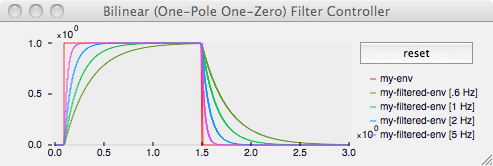Bilinear (First Order IIR) Filter
Filters its inputs by a first order IIR filter controlled by a set of three coefficients

(make-controller 'bilinear-filter ... )
The 'bilinear-filter controller can be created using the following Lisp syntax:
(make-controller 'bilinear-filter dimension period coef_controller input_controller)
The 'bilinear-filter controller takes four arguments:
- dimension: number of dimensions of the input and output controllers.
- period: the time between the updates of the controller. If zero is given then it updates every sample.
- coef_controller: a three-dimensional controller specifying the three bilinear filter coefficients.
- input_controller: filter input (a controller).
The number of dimensions should be the same as that of the input controller.
The coefficient controller should have 3 dimensions which represent the a0, a1 and b1 coefficients.
This filter implements a general first-order (one-pole one-zero) filter which can be used for a variety of purposes, including smoothing out envelopes, and filtering sound-file, signal or other controllers. The following example is shown in one of the graphs (with a 1 Hz cutoff) in the above image:
(setq sp (get-info 'sample-period))
(setq my-env (make-controller 'envelope 1
(list '(0 0.0) '(0.1 0) (list (+ 0.1 sp) 1) '(1.5 1) (list (+ 1.5 sp) 0)) ))
(setq cutoff 1)
(setq val (sin (* cutoff 2 pi sp)))
(setq my-coef-ctl (const (list val 0 (- val 1))))
(setq my-filtered-env (make-controller 'bilinear-filter 1 my-coef-ctl my-env))
You should probably consider using it or the biquadratic-filter, instead of the older filtering functions. However, you will need to generate your own sets of coefficients from higher level parameters such as center/cutoff frequency, etc....
Options
There are no special options for this controller.
- Modalys
- Summary
- An Introduction to Modalys
- Getting Started
- Objects
- Accesses
- Connections
- Controllers
- Constant Controller
- Envelope Controller
- Access Speed Controller
- Access Position Controller
- Access Force Controller
- Connection State Controller
- Last Sample Controller
- Sound File Controller
- MIDI File Controller
- Dynamic Controller
- Send Message
- Set Breakpoint
- Signal Controller
- Scale Controller
- Arithmetic Controller
- Expression Controller
- Foreign-Call Controller
- Sine Controller
- Random Controller
- Band-Limited Noise Controller
- Noise (Band-Limited Impulse) Controller
- Delay Controller
- Bilinear (First Order IIR) Filter
- Biquadratic (Second Order IIR) Filter
- Constant Second Order (Bandpass) Filter
- Variable Second Order (Bandpass) Filter
- Dimension-Mapping Controller
- Sum Controller
- Spread Controller
- Get Controller Info
- The Modalys Workspace
- Finite Elements
- Appendix
- Index
